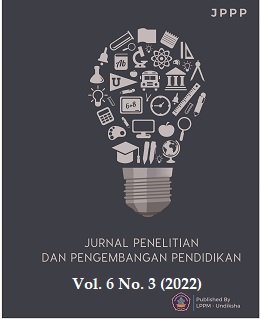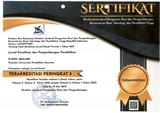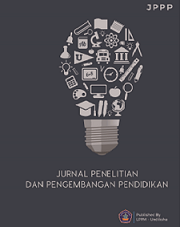The Effectiveness of Environmental Education Learning Strategy Teaching Materials (SPPLH) in Improving Teachers' Cognitive Flexibility
DOI:
https://doi.org/10.23887/jppp.v6i3.56831Keywords:
Education Learning, Strategy Teaching Materials (SPPLH), TeachersAbstract
This study aims to determine the effectiveness of Environmental Education Learning Strategy (SPPLH) teaching materials in increasing the cognitive flexibility of teachers. The method used in this research is the research and development method. This study uses a quantitative approach. The place of research was carried out at SLBN 7 Jakarta. The time of study was carried out from March 2020 to October 2020. The sampling technique was carried out by Random Sampling. Product study this packed in form SPPLH teaching materials as unique references in science _ with notice characteristics of SLBN 7 Jakarta teachers. The results showed that based on the results of the t-test, Cognitive Flexibility t-test 4.42 > t table 2,042. There is a very significant difference between cognitive flexibility scores who were given SPPLH teaching materials, where the score of post-pre-test t treatment was 19.68 higher than teachers who were not given SPPLH teaching materials, namely the post-pre test score control of 9.12. Based on the results of the analysis, the SPPLH. The teaching materials model effectively boosts the teacher's cognitive flexibility in an innovative learning integrated environment.
References
Ahmar, A., & Rahman, A. (2017). Development of teaching material using an Android. Global Journal of Engineering Education, 19(1). https://papers.ssrn.com/sol3/papers.cfm?abstract_id=2924342. DOI: https://doi.org/10.26858/gjeev19i1y2017p7376
Amini, R. (2015). Outdoor based environmental education learning and its effect in caring attitude toward environment. Jurnal Pendidikan IPA Indonesia, 4(1), 43–47. https://doi.org/10.15294/jpii.v4i1.3500.
Anazifa, R. D., & Djukri, D. (2017). Project- Based Learning and Problem-Based Learning: Are They Effective to Improve Student’s Thinking Skills? Jurnal Pendidikan IPA Indonesia, 6(2), 346–355. https://doi.org/10.15294/jpii.v6i2.11100. DOI: https://doi.org/10.15294/jpii.v6i2.11100
Aufa, M. N., Iriani, R., Saadi, P., Hasbie, M., Fitri, M. A., & Yunita, A. (2020). Module Development with Problem Based Learning (PBL) Model Based on Environmental Wetland to Increase Students’ Learning Outcomes. JKPK (Jurnal Kimia Dan Pendidikan Kimia), 5(2), 201–210. https://doi.org/10.20961/jkpk.v5i2.40451. DOI: https://doi.org/10.20961/jkpk.v5i2.40451
Azhary, L., Handoyo, E., & Khafid, M. (2018). The implementation of integrated character education in policy design at SD Muhammadiyah (plus) Salatiga. Journal of Primary Education, 7(2), 172–178. https://doi.org/10.15294/JPE.V7I2.23522.
Baiti, R. R. N., Soedjarwo, S., & Purbaningrum, E. (2021). Management of Student with Special Needs in Inclusive Schools (Case Study in the State Junior High School 30 Surabaya and Alam Insan Mulia Junior High School Surabaya). International Journal for Educational and Vocational Studies, 3(1), 57–63. https://doi.org/10.29103/ijevs.v3i1.3388. DOI: https://doi.org/10.29103/ijevs.v3i1.3388
Baran, M., & Sozbilir, M. (2018). An application of context-and problem-based learning (C-PBL) into teaching thermodynamics. Research in Science Education, 48, 663–689. https://doi.org/10.1007/s11165-016-9583-1. DOI: https://doi.org/10.1007/s11165-016-9583-1
Boa, E. A., Wattanatorn, A., & Tagong, K. (2018). The development and validation of the Blended Socratic Method of Teaching (BSMT): An instructional model to enhance critical thinking skills of undergraduate business students. Kasetsart Journal of Social Sciences, 39(1), 81–89. https://doi.org/10.1016/j.kjss.2018.01.001. DOI: https://doi.org/10.1016/j.kjss.2018.01.001
Borba, M. C. (2021). The future of mathematics education since COVID-19: Humans-with-media or humans-with-non-living-things. Educational Studies in Mathematics, 108(1–2), 385–400. https://doi.org/10.1007/s10649-021-10043-2. DOI: https://doi.org/10.1007/s10649-021-10043-2
Chen, C. M., & Chang, C. C. (2014). Mining learning social networks for cooperative learning with appropriate learning partners in a problem-based learning environment. Interactive Learning Environments, 22(1), 97–124. https://doi.org/10.1080/10494820.2011.641677. DOI: https://doi.org/10.1080/10494820.2011.641677
Cinantya, C., Suriansyah, A., & Asniwati, A. (2018). The model of religion-based character education (multi-site integrated islamic paud sabilal muhtadain and paud islam mawaddah banjarmasin, indonesia). European Journal of Education Studies, 5(7). https://doi.org/10.46827/ejes.v0i0.2097.
Dita, P. P. S., Utomo, S., & Sekar, D. A. (2021). Implementation of Problem Based Learning (PBL) on interactive learning media. Journal of Technology and Humanities, 2(2), 24–30. https://doi.org/10.53797/jthkkss.v2i2.4.2021.
Ellitan, L. (2020). Competing in the era of industrial revolution 4.0 and society 5.0. Jurnal Maksipreneur: Manajemen, Koperasi, Dan Entrepreneurship, 10(1), 1–12. https://doi.org/10.30588/jmp.v10i1.657. DOI: https://doi.org/10.30588/jmp.v10i1.657
Ernst, J., & Erickson, D. M. (2018). Environmental education professional development for teachers: A study of the impact and influence of mentoring. The Journal of Environmental Education, 49(5), 357–374. https://doi.org/10.1080/13504622.2021.2007220. DOI: https://doi.org/10.1080/00958964.2018.1451813
Fitriyani, Y., Supriatna, N., & Sari, M. Z. (2021). Pengembangan Kreativitas Guru dalam Pembelajaran Kreatif pada Mata Pelajaran IPS di Sekolah Dasar. Jurnal Kependidikan: Jurnal Hasil Penelitian Dan Kajian Kepustakaan Di Bidang Pendidikan, Pengajaran Dan Pembelajaran, 7(1), 97. https://doi.org/10.33394/jk.v7i1.3462. DOI: https://doi.org/10.33394/jk.v7i1.3462
Harahap, R. Z. (2015). Etika Islam dalam Mengelola Lingkungan Hidup. EDUTECH: Jurnal Ilmu Pendidikan Dan Ilmu Sosial, 1(1). https://doi.org/10.30596%2Fedutech.v1i01.271.
Hendriana, H. (2014). Membangun kepercayaan diri siswa melalui pembelajaran matematika humanis. Jurnal Pengajaran MIPA, 19(1), 52–60. https://doi.org/10.18269/jpmipa.v19i1.36152. DOI: https://doi.org/10.18269/jpmipa.v19i1.424
Hommel, B. E., Ruppel, R., & Zacher, H. (2022). Assessment of cognitive flexibility in personnel selection: Validity and acceptance of a gamified version of the Wisconsin Card Sorting Test. International Journal of Selection and Assessment, 30(1), 126–144. https://doi.org/10.1111/ijsa.12362. DOI: https://doi.org/10.1111/ijsa.12362
Howlett, C. A., Wewege, M. A., Berryman, C., Oldach, A., Jennings, E., Moore, E., & Moseley, G. L. (2021). Same room-different windows? A systematic review and meta-analysis of the relationship between self-report and neuropsychological tests of cognitive flexibility in healthy adults. Clinical Psychology Review, 88, 102061. https://doi.org/10.1016/j.cpr.2021.102061. DOI: https://doi.org/10.1016/j.cpr.2021.102061
Hsu, F. H., Lin, I. H., Yeh, H. C., & Chen, N. S. (2022). Effect of Socratic Reflection Prompts via video-based learning system on elementary school students’ critical thinking skills. Computers & Education, 183, 104497. https://doi.org/10.1016/j.compedu.2022.104497. DOI: https://doi.org/10.1016/j.compedu.2022.104497
Ionescu, T. (2012). Exploring the nature of cognitive flexibility. New Ideas in Psychology, 30(2), 190–200. https://doi.org/10.1016/j.newideapsych.2011.11.001. DOI: https://doi.org/10.1016/j.newideapsych.2011.11.001
Lase, D. (2019). Education and industrial revolution 4.0. Jurnal Handayani Pgsd Fip Unimed, 10(1), 48–62. https://doi.org/10.24114/jh.v10i1.14138. DOI: https://doi.org/10.24114/jh.v10i1.14138
Lubis, A. S., Absah, Y., & Lumbanraja, P. (2019). Human resource competencies 4.0 for generation z. European Journal of Human Resource Management Studies, 3(1). https://doi.org/10.46827/ejhrms.v0i0.614.
Mahdayeni, M., Alhaddad, M. R., & Saleh, A. S. (2019). Manusia dan Kebudayaan (Manusia dan Sejarah Kebudayaan, Manusia dalam Keanekaragaman Budaya dan Peradaban, Manusia dan Sumber Penghidupan). Tadbir: Jurnal Manajemen Pendidikan Islam, 7(2), 154–165. https://doi.org/10.30603/tjmpi.v7i2.1125. DOI: https://doi.org/10.30603/tjmpi.v7i2.1125
Maimunah, M., Aslamiah, A., & Suriansyah, A. (2018). The integration of sentra-based Learning and involvement of family program at early childhood in developing character building (Multi Case at PAUD Mawaddah and PAUD Alam Berbasis Karakter Sayang Ibu Banjarmasin, Indonesia). European Journal of Education Studies, 5(7). https://doi.org/10.46827/ejes.v0i0.2101.
Mudiartana, I. M., Margunayasa, I. G., & Divayana, D. G. H. (2021). How is The Development of Valid and Practical Android-Based Local Wisdom Teaching Materials? Jurnal Ilmiah Sekolah Dasar, 5(3), 403–414. https://doi.org/10.23887/jisd.v5i3.38176. DOI: https://doi.org/10.23887/jisd.v5i3.38176
Mulang, H. (2021). The Effect of Competences, Work Motivation, Learning Environment on Human Resource Performance. Golden Ratio of Human Resource Management, 1(2), 84–93. https://doi.org/10.52970/grhrm.v1i2.52. DOI: https://doi.org/10.52970/grhrm.v1i2.52
Omar, S. M., Chowdhury, A. J. K., & Hashi, A. A. (2018). Islamic ethics of waste management towards sustainable environmental health. IIUM Medical Journal Malaysia, 17(1). https://doi.org/10.31436/imjm.v17i1.1024. DOI: https://doi.org/10.31436/imjm.v17i1.1024
Pappas, M. A., Papoutsi, C., & Drigas, A. S. (2018). Policies, practices, and attitudes toward inclusive education: The case of Greece. Social Sciences, 7(6). https://doi.org/10.3390/SOCSCI7060090. DOI: https://doi.org/10.3390/socsci7060090
Phungsuk, R., Viriyavejakul, C., & Ratanaolarn, T. (2017). Development of a problem-based learning model via a virtual learning environment. Kasetsart Journal of Social Sciences, 38(3), 297–306. https://doi.org/10.1016/j.kjss.2017.01.001. DOI: https://doi.org/10.1016/j.kjss.2017.01.001
Rapp, A., & Cena, F. (2016). Personal informatics for everyday life: How users without prior self-tracking experience engage with personal data. International Journal of Human-Computer Studies, 94, 1–17. https://doi.org/10.1016/j.ijhcs.2016.05.006. DOI: https://doi.org/10.1016/j.ijhcs.2016.05.006
Schettino, C. (2016). A framework for problem-based learning: Teaching mathematics with a relational problem-based pedagogy. Interdisciplinary Journal of Problem-Based Learning, 10(2), 12. https://doi.org/10.7771/1541-5015.1602. DOI: https://doi.org/10.7771/1541-5015.1602
Sheppes, G., Scheibe, S., Suri, G., Radu, P., Blechert, J., & Gross, J. J. (2014). Emotion regulation choice: a conceptual framework and supporting evidence. Journal of Experimental Psychology: General, 143(1), 163. https://doi.org/10.1037/a0030831. DOI: https://doi.org/10.1037/a0030831
Tangney, S. (2014). Student-centred learning: a humanist perspective. Teaching in Higher Education, 19(3), 266–275. https://doi.org/10.1080/13562517.2013.860099. DOI: https://doi.org/10.1080/13562517.2013.860099
Tseng, K. H., Chang, C. C., Lou, S. J., & Chen, W. P. (2013). Attitudes towards science, technology, engineering and mathematics (STEM) in a project-based learning (PjBL) environment. International Journal of Technology and Design Education, 23, 87–102. https://doi.org/10.1007/s10798-011-9160-x. DOI: https://doi.org/10.1007/s10798-011-9160-x
Ulger, K. (2018). The effect of problem-based learning on the creative thinking and critical thinking disposition of students in visual arts education. Interdisciplinary Journal of Problem-Based Learning, 12(1). https://doi.org/10.7771/1541-5015.1649. DOI: https://doi.org/10.7771/1541-5015.1649
Wahyudi, A., & Huda, M. (2019). Internalization of Islamic Values for Students with Special Needs in Special School Education Institutions (SLB). AL-HAYAT: Journal Of Islamic Education, 3(1), 90–97. https://doi.org/10.35723/ajie.v3i1.55. DOI: https://doi.org/10.35723/ajie.v3i1.55
Xia, X., Shen, X., Du, Y., Ye, W., & Wang, C. (2016). Study on glutathione’s inhibition to dopamine polymerization and its application in dopamine determination in alkaline environment based on silver selenide/molybdenum selenide/glassy carbon electrode. Sensors and Actuators B: Chemical, 237, 685–692. https://doi.org/10.1016/j.snb.2016.06.154. DOI: https://doi.org/10.1016/j.snb.2016.06.154
Zachariou, F., Tsami, E., Chalkias, C., & Bersimis, S. (2017). Teachers’ Attitudes towards the Environment and Environmental Education: An Empirical Study. International Journal of Environmental and Science Education, 12(7), 1567–1593. https://www.academia.edu/download/54497599/IJESE_1924_article_59b63fb40e81e.pdf.
Downloads
Published
How to Cite
Issue
Section
License
Copyright (c) 2023 Irah Kasirah, Nadiroh , Hafid Abbas

This work is licensed under a Creative Commons Attribution-ShareAlike 4.0 International License.
Authors who publish with the Jurnal Penelitian dan Pengembangan Pendidikan agree to the following terms:
- Authors retain copyright and grant the journal the right of first publication with the work simultaneously licensed under a Creative Commons Attribution License (CC BY-SA 4.0) that allows others to share the work with an acknowledgment of the work's authorship and initial publication in this journal.
- Authors are able to enter into separate, additional contractual arrangements for the non-exclusive distribution of the journal's published version of the work (e.g., post it to an institutional repository or publish it in a book), with an acknowledgment of its initial publication in this journal.
- Authors are permitted and encouraged to post their work online (e.g., in institutional repositories or on their website) prior to and during the submission process, as it can lead to productive exchanges, as well as earlier and greater citation of published work. (See The Effect of Open Access)








